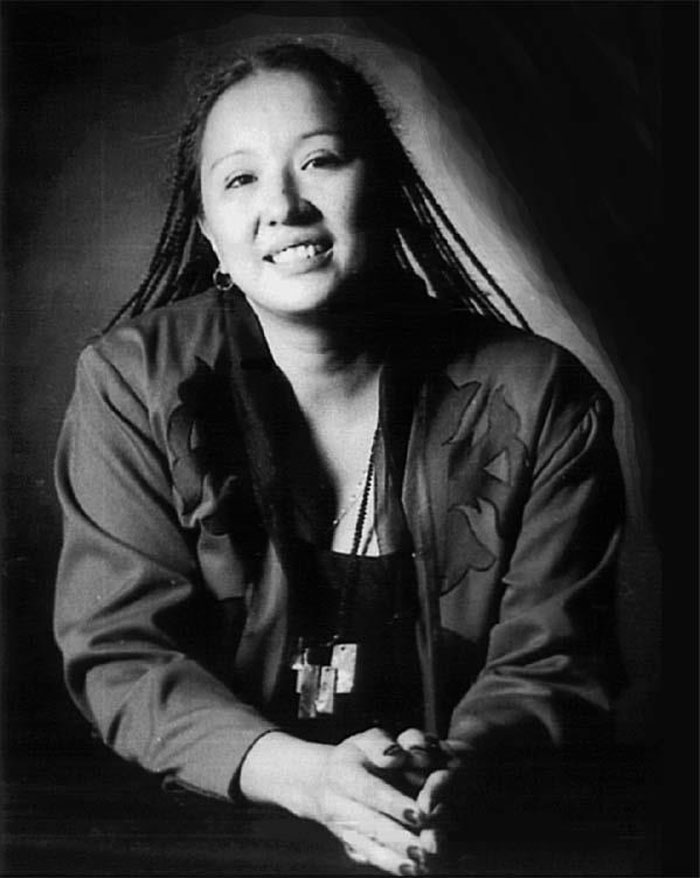During the month of March, in recognition of Women's History Month, Native News Online will feature various Native American women who have contributed to the betterment of Indian Country.

Ingrid Washinawatok (July 31, 1957 — February 22, 1999)
Ingrid Washinawatok, which translates to “Flying Eagle Woman,” left a mark on the world through her unwavering commitment to her people and their struggles.
Born in 1957, Washinawatok was a member of the Menominee Nation of Wisconsin. She grew up on the Menominee reservation during the era of Indian termination and witnessed firsthand the devastating impacts of federal policies on Native communities.
The termination policy, which aimed to dissolve tribal nations and strip Indigenous peoples of their sovereignty, left a deep scar on tribal communities like the Menominee, putting them into poverty and social upheaval. During this time, Washinawatok’s activism was ignited.
During her high school years, Washinawatok became actively involved in the Menominee Nation’s restoration efforts, rallying support from tribal nations and advocacy groups to repeal termination and reinstate federal recognition for affected nations.
Washinawatok’s advocacy spanned various fronts, from education to environmental protection and Indigenous sovereignty. She believed in the power of education to uplift Indigenous communities and worked tirelessly to ensure that Indigenous youth had access to quality education that honored their cultural identity and history.
Washinawatok’s contributions to Indigenous education were significant. She co-founded the Waswagoning (Lac du Flambeau) Ojibwe Language Immersion School in Wisconsin, which aimed to revitalize the Ojibwe language and culture among younger generations. Through her efforts, Washinawatok sought to combat the erosion of Indigenous languages and promote cultural revitalization.
Beyond education, Washinawatok was an advocate for Indigenous land rights and environmental conservation. She understood the intimate connection between Indigenous peoples and their ancestral lands, recognizing that the preservation of these lands was crucial for both cultural survival and environmental sustainability. Her work highlighted the importance of Indigenous knowledge and practices in stewarding the Earth.
Tragically, Washinawatok’s life was cut short in 1999 when she was abducted and murdered by armed militants while working on a humanitarian mission in Colombia. Her untimely death sent shockwaves through the Indigenous rights community, underscoring the risks and dangers faced by activists working on the frontlines of social justice.
Her legacy lives on through the countless lives she touched and the causes she championed. Her bravery, resilience, and unwavering commitment to justice continue to inspire indigenous activists and advocates around the world. Despite the challenges and obstacles she faced, Washinawatok remained steadfast in her pursuit of a better future for indigenous peoples everywhere.
More Stories Like This
Native News Weekly (August 25, 2024): D.C. BriefsUS Presidents in Their Own Words Concerning American Indians
Indigenous Actor Elaine Miles Reports Detention by Alleged ICE Agents
Happy Thanksgiving from Native News Online
Coming Up on Native Bidaské: Behind the Animation: Joey Clift Talks “Pow” and Native Storytelling
Help us tell the stories that could save Native languages and food traditions
At a critical moment for Indian Country, Native News Online is embarking on our most ambitious reporting project yet: "Cultivating Culture," a three-year investigation into two forces shaping Native community survival—food sovereignty and language revitalization.
The devastating impact of COVID-19 accelerated the loss of Native elders and with them, irreplaceable cultural knowledge. Yet across tribal communities, innovative leaders are fighting back, reclaiming traditional food systems and breathing new life into Native languages. These aren't just cultural preservation efforts—they're powerful pathways to community health, healing, and resilience.
Our dedicated reporting team will spend three years documenting these stories through on-the-ground reporting in 18 tribal communities, producing over 200 in-depth stories, 18 podcast episodes, and multimedia content that amplifies Indigenous voices. We'll show policymakers, funders, and allies how cultural restoration directly impacts physical and mental wellness while celebrating successful models of sovereignty and self-determination.
This isn't corporate media parachuting into Indian Country for a quick story. This is sustained, relationship-based journalism by Native reporters who understand these communities. It's "Warrior Journalism"—fearless reporting that serves the 5.5 million readers who depend on us for news that mainstream media often ignores.
We need your help right now. While we've secured partial funding, we're still $450,000 short of our three-year budget. Our immediate goal is $25,000 this month to keep this critical work moving forward—funding reporter salaries, travel to remote communities, photography, and the deep reporting these stories deserve.
Every dollar directly supports Indigenous journalists telling Indigenous stories. Whether it's $5 or $50, your contribution ensures these vital narratives of resilience, innovation, and hope don't disappear into silence.
 The stakes couldn't be higher. Native languages are being lost at an alarming rate. Food insecurity plagues many tribal communities. But solutions are emerging, and these stories need to be told.
The stakes couldn't be higher. Native languages are being lost at an alarming rate. Food insecurity plagues many tribal communities. But solutions are emerging, and these stories need to be told.
Support independent Native journalism. Fund the stories that matter.
Levi Rickert (Potawatomi), Editor & Publisher

